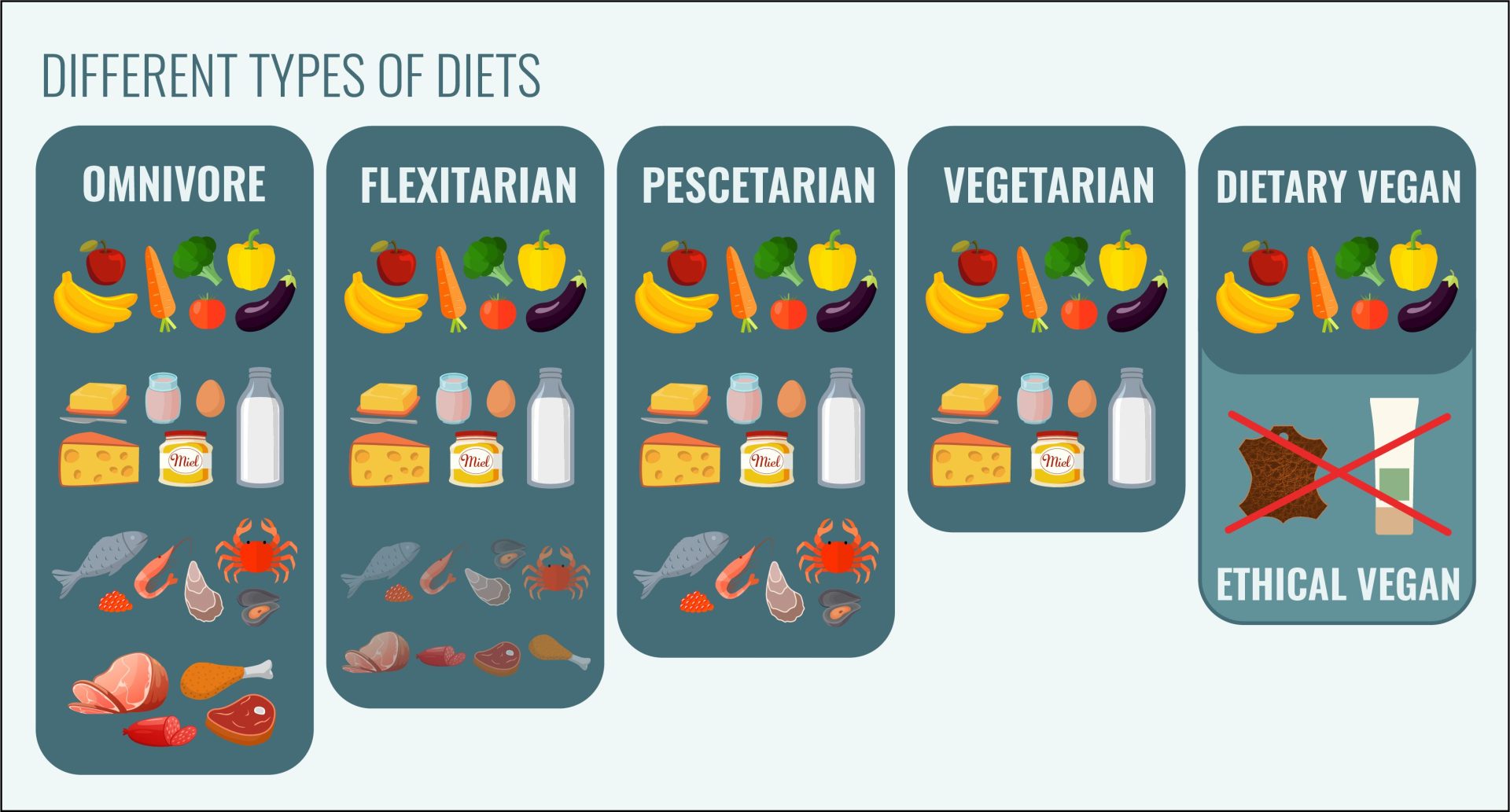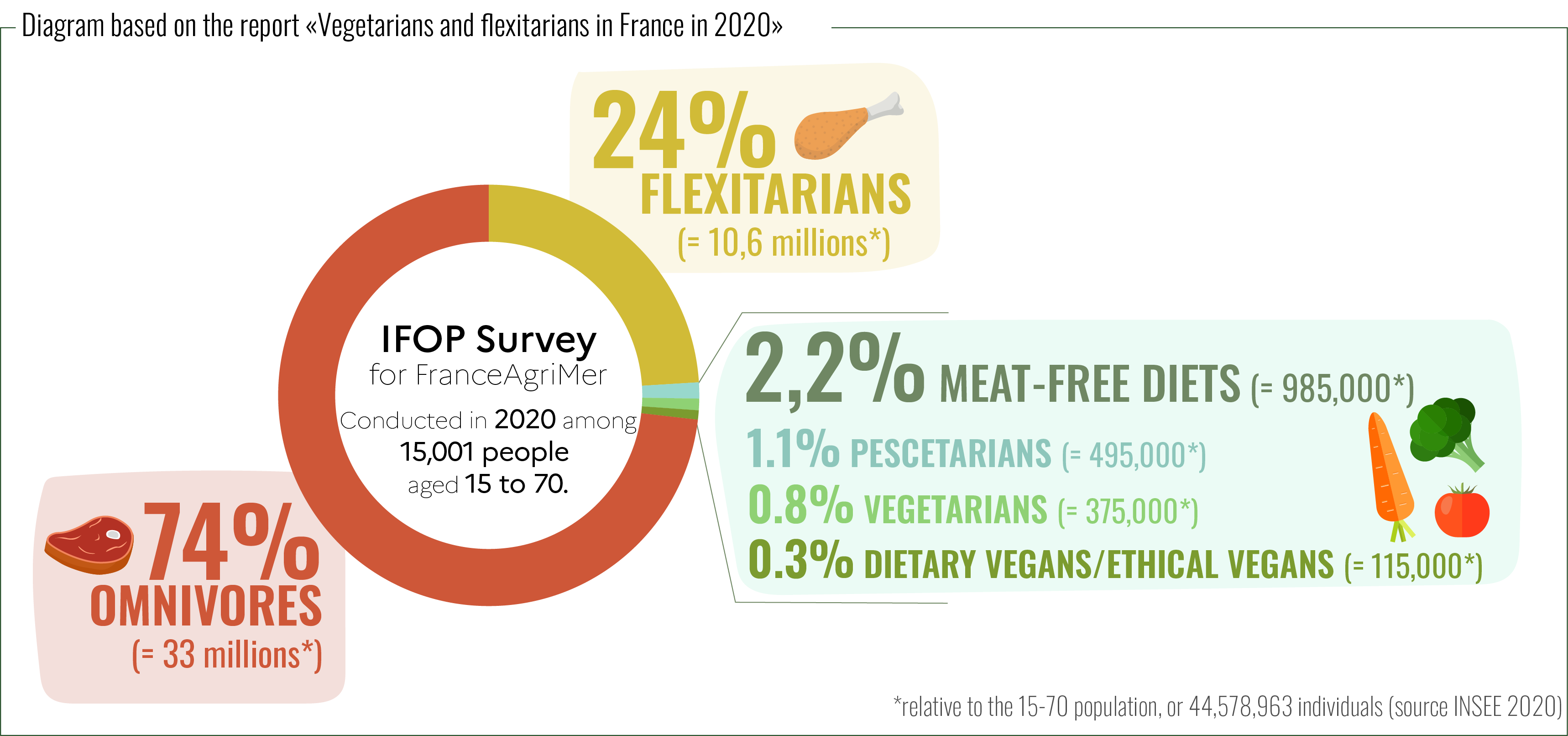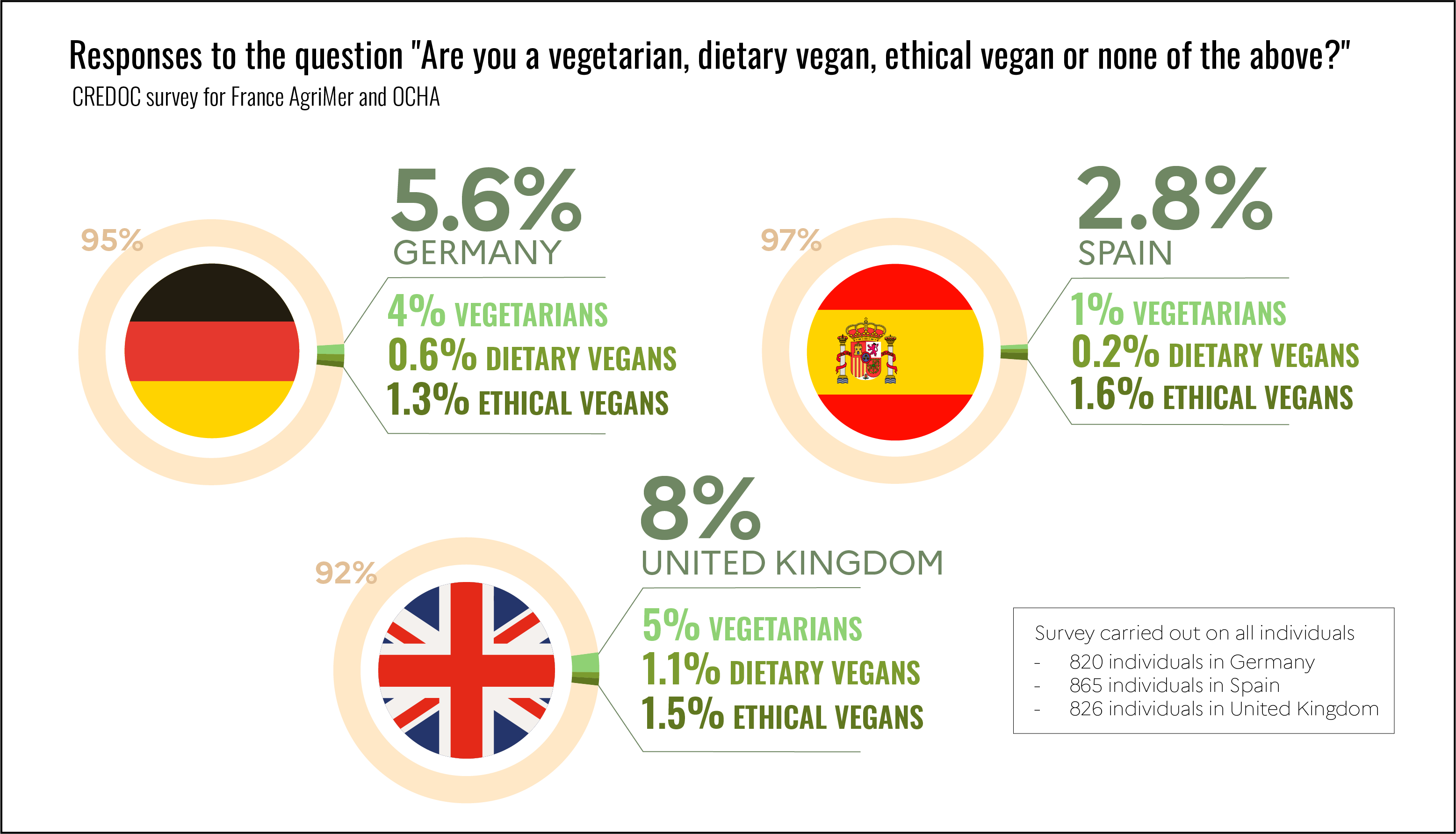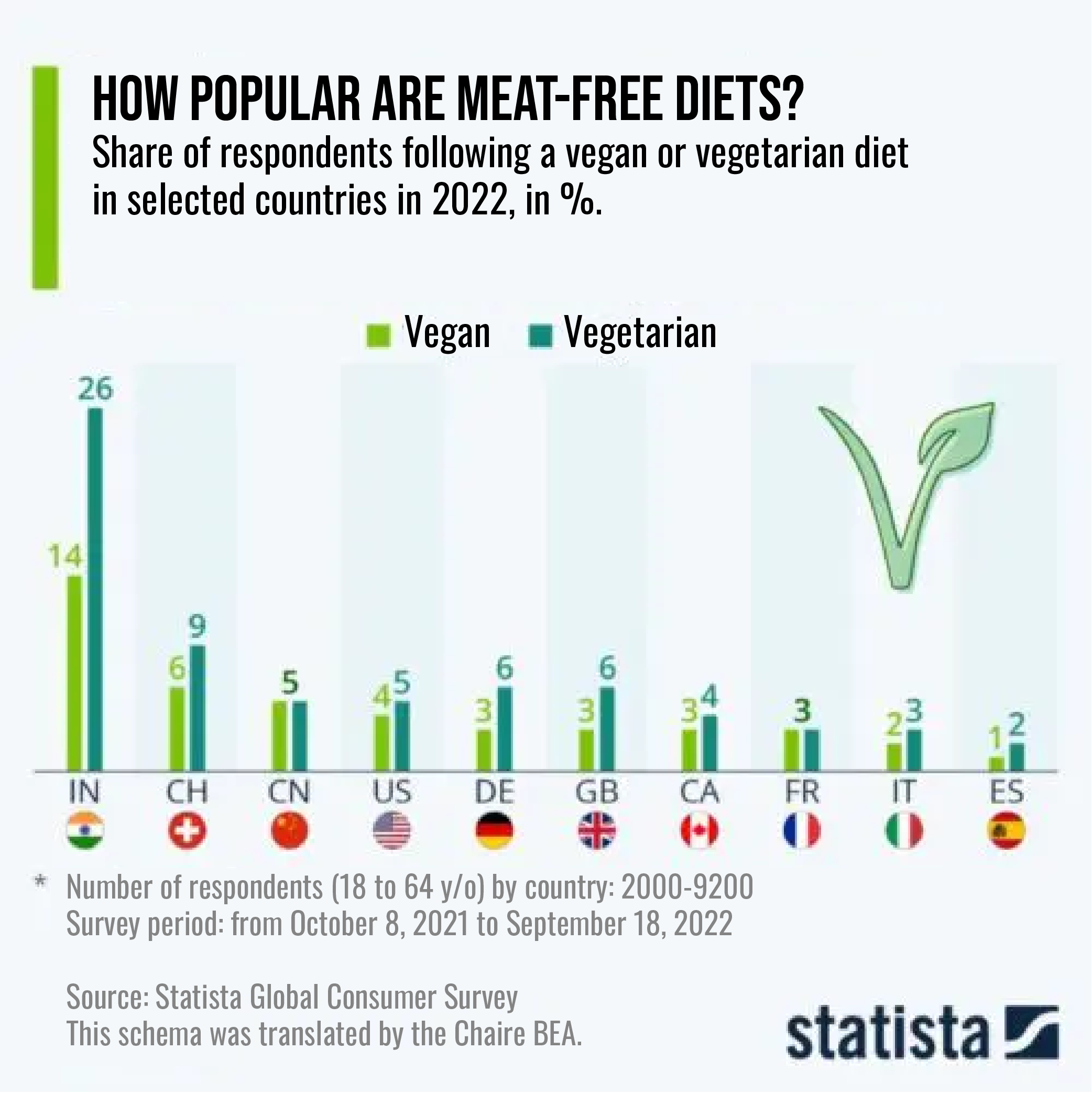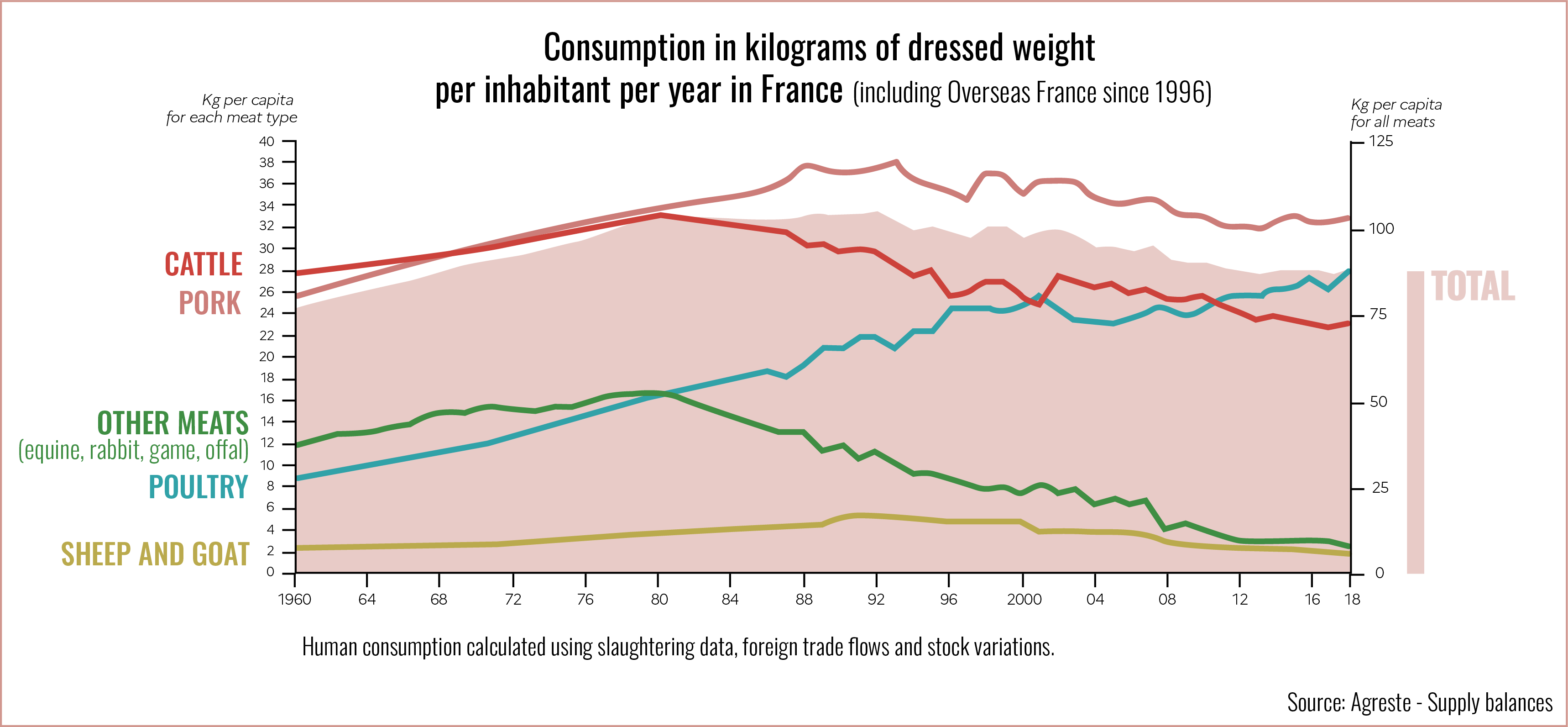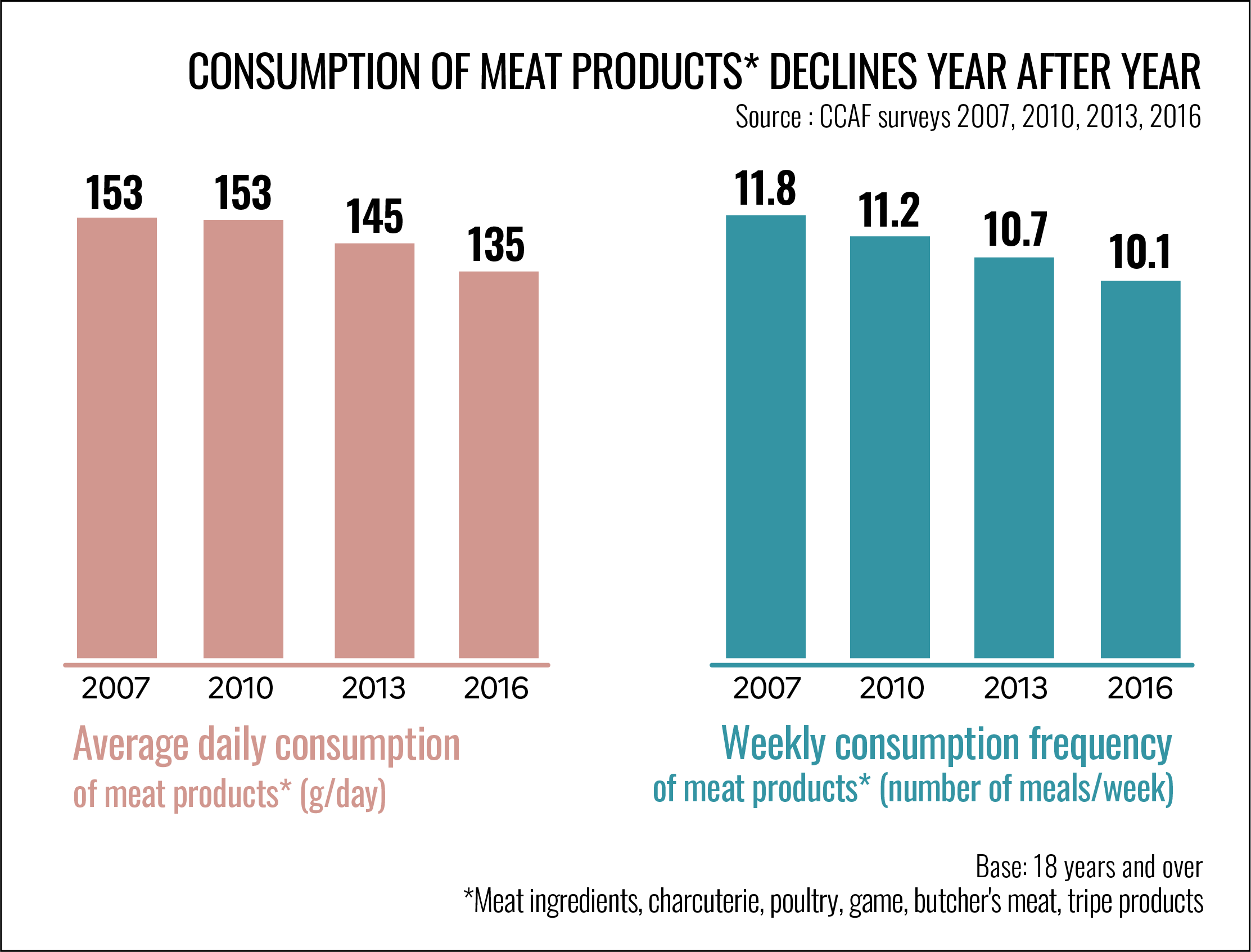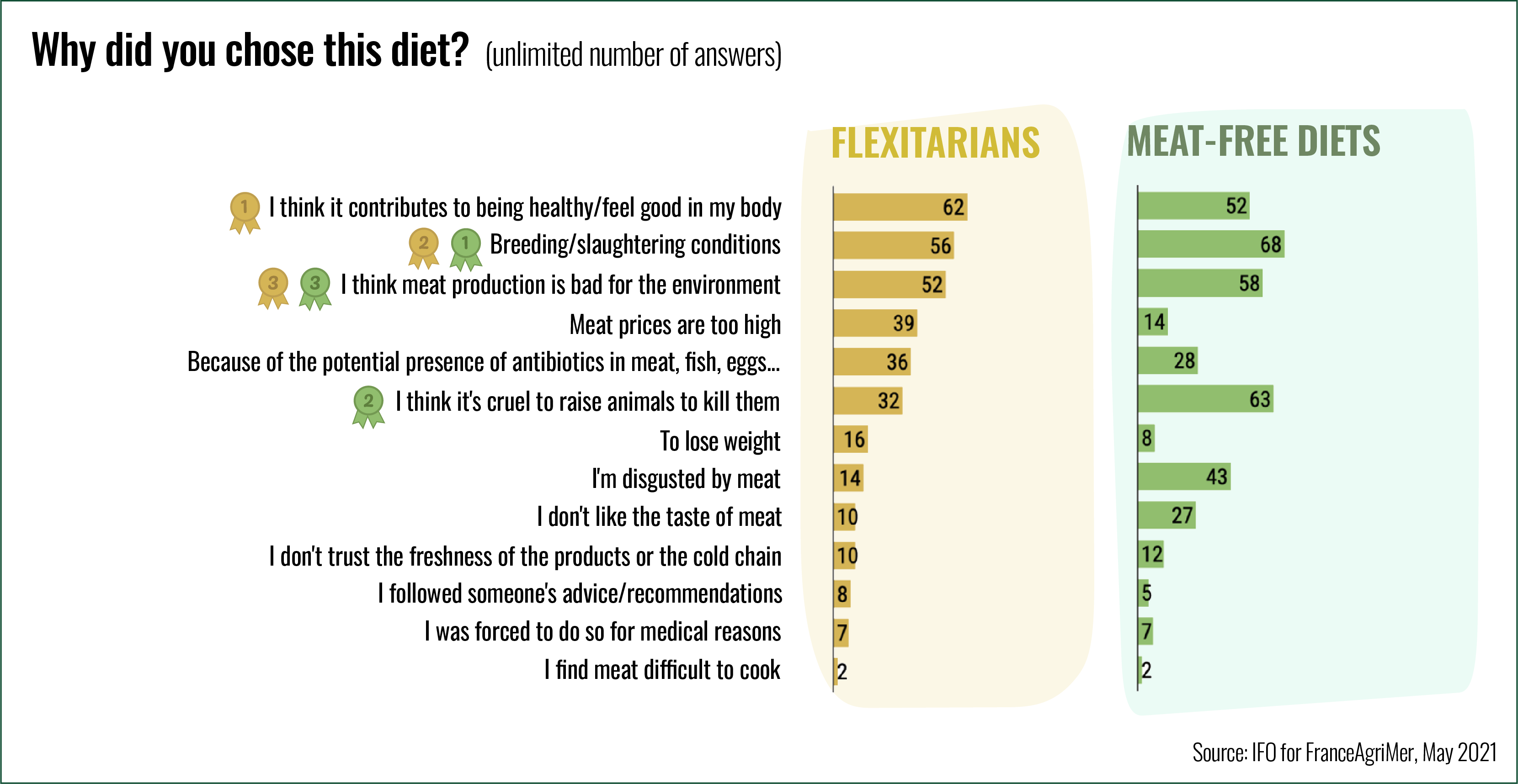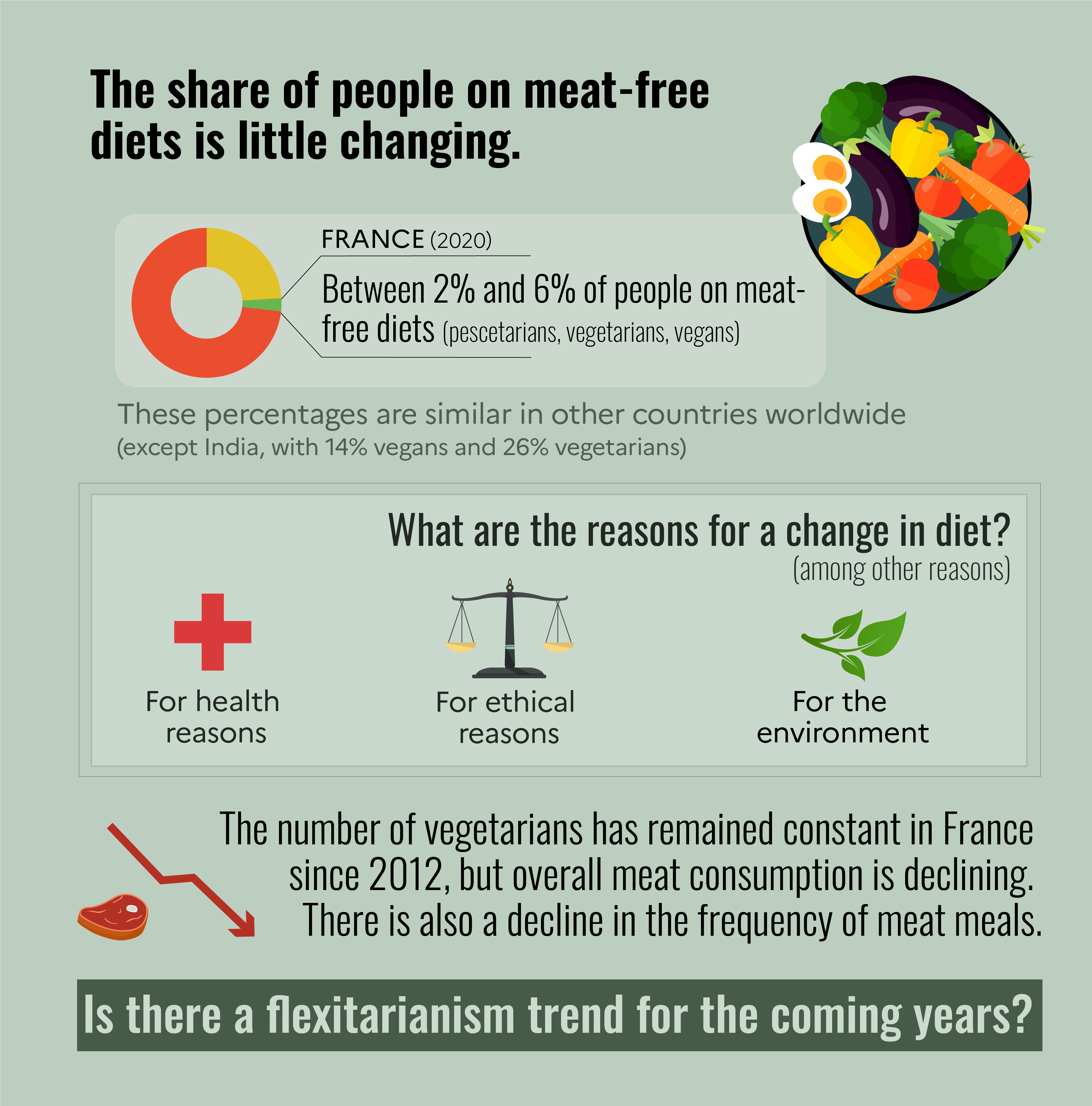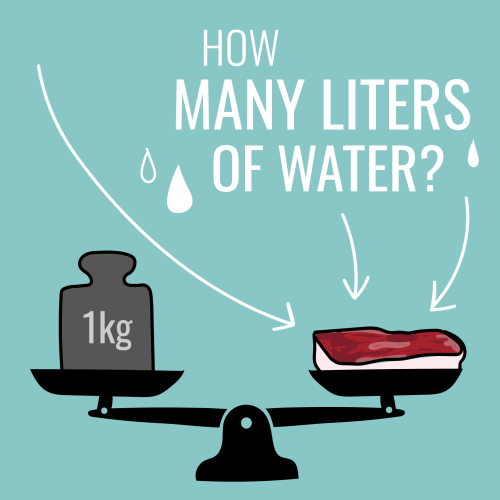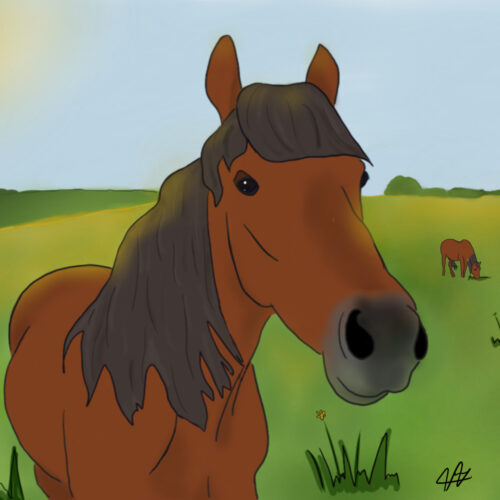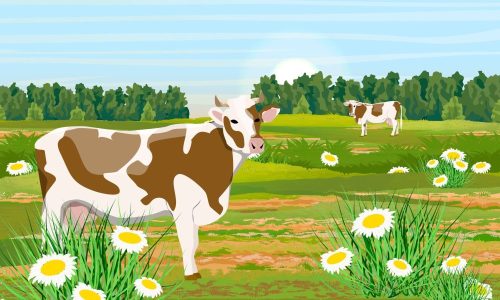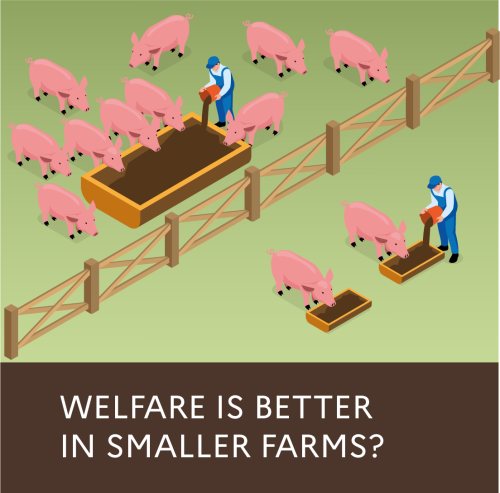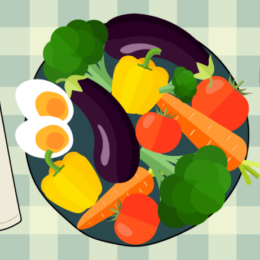

FALSE
This share has changed little and remains low in the French population, as in other countries. However, there has been a steady decline in average meat consumption in France.
Keep in mind
- The number of vegetarians and vegans is low in France and Europe
- The number of flexitarians is significant and growing, even if the definition of flexitarianism needs to be clarified
- Meat consumption is declining, as is the frequency of meat meals
What are the different diets?
Before presenting their relative shares, it is important to define these types of diets.
There are different diet types:
- The omnivorous diet, for people who eat both animal and plant products.
- The vegetarian diet, for people who do not eat animal flesh (meat, fish) but who do eat dairy products or eggs.
- The pescetarian diet, for people who don’t eat meat but do eat fish or seafood.
- The vegan diet, for people who eat only plant-based products. This means they eat no meat, no fish or seafood, but also no dairy products, eggs or honey.
- The flexitarian diet, for people with an omnivorous diet who tend to limit their consumption of animal products.
📌 For more information
There is no official definition of flexitarianism, and one saying they are flexitarian is subjective. Flexitarians may have different diets, eating meat regularly or very occasionally.

Did you know?
Veganism is much broader than a simple diet. Ethical veganism thus refers to people who do not use any products of animal origin, whether in their food, clothing or products tested on animals (cosmetics, household products...).
The choice of diet is, of course, an individual one, and everyone is free to choose the diet that suits them best, according to their financial capabilities, their convictions, their desires and so on. However, greater consideration for the welfare of farm animals and the need to tackle the climate crisis mean that we need to reduce the number of animal products we use, while favoring more respectful, locally-produced products. Indeed, the latest IPCC report[1] reminds us that a diet low in animal proteins is associated with lower greenhouse gas emissions.
In short:
What is the relative share of each diet among the French population?
The data presented below comes from the IFOP survey conducted for FranceAgriMer from September 30 to November 08, 2020 among 15,000 people aged 15 to 70 and representative of the French population[2]. According to this survey:
- The share of omnivores is the highest at 74% of respondents or about 33 million people, relative to the total French population aged between 15 and 70 (which is 44.5 million according to INSEE 2020).
- The share of flexitarians is 24% of respondents, i.e. just over 10 million people.
- The share of meat-free diet is relatively low (2.2%), and the share of dietary vegans/ethical vegans is even lower (0.3%). This amounts to just under 1 million and just over 100,000 people respectively.
Another study, carried out by Statista in 2022, gives slightly higher shares, with 3% vegetarians and 3% vegans.
It’s interesting to note that the notion of flexitarianism is relative, and is more likely to measure a willingness to cut back than an actual quantity.
According to an Ipsos survey conducted for Interbev in April 2021[3] among 1008 people aged 18 and over, 59% of those who said they knew the definition of flexitarianism defined a flexitarian as “a person who eats everything, including meat and fish in reasonable quantities and with concern for how they are produced“, while 41% defined it as “a person who follows a vegetarian diet, but allows themselves to eat meat and fish on certain occasions (restaurants, feasts…)“.
For example, 29% of flexitarians claim to eat meat every day, while 11% of omnivores claim to limit their meat consumption to less than once a day, i.e. less than some flexitarians[4].

In brief
The share of the French population declaring a meat-free diet remains a minority. It ranges between 2% and 6% according to various studies.
What about other countries?
Studies show that in other European countries (Germany, Spain, UK), the share of people declaring a meat-free diet is also relatively low.
For example, a CREDOC (Centre de Recherche pour l’Étude et l’Observation des Conditions de Vie) survey carried out in 2018 for FranceAgriMer and OCHA (Observatoire CNIEL des Habitudes Alimentaires)[5] indicates that the share of people declaring themselves vegetarian or dietary vegan is 5.6% for Germany, 2.8% for Spain and 8% for the UK.
This study also shows a difference between the percentage of people declaring themselves vegetarians or dietary vegans and the share of people declaring they never eat meat products, which is lower. This difference in percentage between the stated diet and the act of never eating meat indicates that definitions may not always be clear to everyone, or that some people declare themselves “globally” vegetarian or vegan, but sometimes allow themselves a few deviations from their diet.
Worldwide, the shares of dietary vegans and vegetarians remain more or less the same (between 3% and 10%), except in India, where 14% of people declare themselves dietary vegans and 26% vegetarians[6].
How are diets and meat consumption changing?
In 2016, 10% of French people said they were considering becoming vegetarians, a number that increased in 2021, with 32% saying they were (certainly or probably) ready to stop eating meat[7]. However, according to OpinionWay / Terra eco polls[8], the number of vegetarians in France has remained stable since 2012.
And yet, even if the number of vegetarians is not increasing, there has been a steady decline in overall meat consumption in France between 1992 and 2018[9]. Each French ate an average of 105 kg (dressed weight)[10]of meat per year in 1992, compared with an average 88 kg (dressed weight) in 2018, a 15% decrease in just over 25 years. It should be noted, however, that poultry meat consumption is still on the rise.
Another study by CREDOC[11] confirms this trend, with a drop in the average quantity of meat products consumed per day from 153 g to 135 g between 2007 and 2016, and also a drop in the consumption frequency, with a frequency of 11.8 meals with meat per week in 2007 vs. 10.1 in 2016. This trend is heavier among blue-collar and white-collar staff than in the rest of the population, but probably for different reasons.
What are the reasons for a change in diet?
There are a number of reasons for changing your diet and eating less meat: economic, ethical, health-related or even taste-related reasons.
Vegetarians and vegans have adopted a meat-free diet mainly for ethical reasons, particularly those relating to animal welfare.
Flexitarians, on the other hand, have reduced their meat consumption mainly for health reasons, followed by ethical reasons (animal welfare and preservation of the environment). Cost is not a top reason for reducing meat consumption for these two populations, but it may be for some omnivores[14].
What's the outlook for the next few years?
It’s difficult to answer the question of future trends, but it’s likely that meat consumption will continue to decline, whatever the reasons given (health, finance, environment, animal welfare, etc.).
In 2017, the French Ministry of Agriculture and Food Sovereignty commissioned a forward-looking study on eating habits by 2025[15] and produced 16 “trends and impacts” sheets. The sheet devoted to animal protein consumption[16] anticipates that animal protein consumption will continue to decline in France, with an increase in flexitarianism and a rise in the consumption of plant proteins (legumes, cereals). It argues that insect consumption should remain trivial in France for human consumption[17]. Lastly, while the consumption of synthetic meat has received some media coverage, it is not yet authorized in France, and production is not yet industrialized.
The trend towards flexitarianism is confirmed by more recent surveys. According to an IFOP and Just Eat[18]survey conducted in 2021, 65% of respondents were thinking of adopting a flexitarian diet. This trend could explain the recent development of vegetarian and vegan products, which may give the impression of a large number of strict vegetarians and vegans, when in fact they are few in number. In fact, the economic research institute Xerfi estimates that flexitarianism will be one of the main drivers of the vegetarian and vegan market, with a potential market of 600 million euros by 2025[19].
In short
[1] https://report.ipcc.ch/ar6/wg2/IPCC_AR6_WGII_FullReport.pdf
[2] https://www.franceagrimer.fr/Actualite/Etablissement/2021/VEGETARIENS-ET-FLEXITARIENS-EN-FRANCE-EN-2020
[3] https://www.interbev-pdl.fr/_medias/PDLO/documents/cpinterbevcampagnecomcollectivesaison2.pdf
[4] https://www.franceagrimer.fr/Actualite/Etablissement/2021/VEGETARIENS-ET-FLEXITARIENS-EN-FRANCE-EN-2020
[5]https://www.franceagrimer.fr/fam/content/download/62309/document/11_Synth%C3%A8se%20Panorama%20v%C3%A9g%C3%A9tarisme%20en%20Europe.pdf?version=1
[6] https://fr.statista.com/infographie/28645/pourcentage-de-personnes-qui-suivent-un-regime-vegan-ou-vegetarien-par-pays/
[7] http://harris-interactive.fr/wp-content/uploads/sites/6/2021/09/Rapport_Harris_-_Animaux_et_societe_Cetelem.pdf
[8] https://www.terraeco.net/Sondage-qui-sont-les-vegetariens,64594.html
[9] https://www.agreste.agriculture.gouv.fr/agreste-web/download/publication/publie/Pri2004/Primeur%202020-4%20ConsoViande.pdf
[10] Dressed weight
[11] https://www.credoc.fr/publications/les-nouvelles-generations-transforment-la-consommation-de-viande
[12] https://www.credoc.fr/publications/les-nouvelles-generations-transforment-la-consommation-de-viande
[13] https://www.statista.com/forecasts/768475/vegetarianism-and-veganism-among-young-adults-in-selected-european-countries
[14] https://www.franceagrimer.fr/Actualite/Etablissement/2021/VEGETARIENS-ET-FLEXITARIENS-EN-FRANCE-EN-2020
[15] https://agriculture.gouv.fr/comportements-alimentaires-la-france-en-2025
[16] https://agriculture.gouv.fr/telecharger/84019
[17] Insects have been considered food since January 2018 under European regulations. However, France has not yet authorized the marketing of insects as food for human consumption.
[18] https://d200r6uh7skyrf.cloudfront.net/articles/57026/cp-datalicious-just-eat-2021-ok.pdf
[19] https://www.xerfi.com/blog/L-alimentation-vegetarienne-et-vegane-un-marche-en-voie-de-democratisation-_910
Keep in mind
- The number of vegetarians and vegans is low in France and Europe
- The number of flexitarians is significant and growing, even if the definition of flexitarianism needs to be clarified
- Meat consumption is declining, as is the frequency of meat meals
Key Figure
of flexitarians say they eat meat every day, while 11% of omnivores say they limit their meat consumption to less than once a day.

